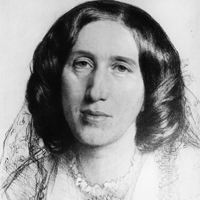The Comparative Study of Hetty Sorrel of Adam Bede and Hester Prynne of The Scarlet Letter
There are two female protagonists in George Eliot's Adam Bede whereas there is only one female protagonist in Nathaniel Howthorne's The Scarlet Letter. Hetty Sorrel and Dinah Morris are two female protagonists in Adam Bede. To some extent Hetty Sorrel resembles Hester Prynne.

Mary Ann Evans (George Eliot)
Both Hetty and Hester had to face sex scandal. Hetty fell victims of the harmful effects of premarital sex whereas Hester Prynne fell prey to the ridiculous and disgraceful consequences of her extra-marital affair. Hetty was sensual, emotional and impulsive. She was infatuated with a young squire Arthur Donnithorne. She wanted to be a wife of Arthur Donnithorne. She fell in love with Arthur Donnithorne. She was ignorant about the fact that however deep her love for Arthur Donnithorne might be, she can't be his wife. Her class was much lower in comparison to the class of Arthur. Hetty did not know about this fact. In her emotional frenzy she loved Donnithorne passionately. Her impulsive nature gets revealed, from her obsession with her self-image in the mirror. An impetuous girl devoid of any remnant of rational sensibility she always used to stand in front of her mirror. A girl simply driven by tempestuous passion, Hetty surrendered to Arthur Donnithorne sexually. Unlike Hetty Sorrell, The Scarlet Letter's female protagonist Hester Prynne surrendered to Arthur Dimmesdale not out of her overwhelming emotion and impulse, but out of her sexual dissatisfaction marriage and love tainted with lust. Before their sexual surrender to their respective sex-partner, Hetty Sorrel was unmarried whereas Hester Prynne was already married with an old man named Rogar Chillingworth. Most probably, Hester Prynne fell in love with Arthur Dimmesdale and consummated her love with him because of her extreme dissatisfaction with her old husband who was absent in the 18th century New England. Hester's search for her lover was induced by her conscious choice whereas Hetty's infatuation with Arthur Donnithorne was caused by the overwhelming power of her tempestuous passion.
In comparison to Hetty, Hester Prynne was dauntless and bold. Hetty Sorrel had fragile- will power, whereas as Hester Prynne had an undefeated will power. When Hetty delivered an infant in the jungle, and felt ashamed and guilty, she contemplated suicide. Hester Prynne was disgraced publicly and ostracized totally in the 18th century. Puritan society dictated tyrannically by its absolute emphasis on rigorous morality. She was forced to live in isolation. Even at this shameful and painfully torturous period of her life, Hester Prynne did not lose her heart. She did not become defeated. She continued to struggle. Even in deathly isolation she fulfilled her motherly duty by nurturing Pearl. She determined to transcend her punishing position as an adultery. A sense of unwavering determination pushed Hester Prynne to further creative action. She took part in acts of charities and profuse generosity. From the level of adultery, she rose to the highest level of angelic mercy. Unlike Hetty Sorrel, Hester Prynne is the sort of a female protagonist who was capable of converting tragedy into glorious adventure. Society punished Hester without understanding the depth of her emotions and desires. In return, it is she who beat this puritan society by changing her tragic lot as an adulterer to the ideal level of an ideally committed womanhood. In this regard it is she who truly deserves the credit of being an individual.
By Adam Bede, Hetty Sorrel was rescued from legal penalty by her erstwhile lover, but in The Scarlet Letter it is Hester Prynne, who advised her lover to flee to save his life. Hester Prynne is representative of what a woman with unwavering will power can become if she is unjustifiably and disgracefully subjected to social ostracism. Hetty Sorrel in Adam Bede represents what a teenage girl can become if she gives free rein to her emotion. Hester Prynne is the sort of female protagonist whose actions, whose life and whose thoughts constitute the thematic core of the novel. Hetty Sorrel is the sort of character who is employed by George Eliot to project the philosophy of determinism. Hetty is a slave to her distinction, whereas Hester Prynne is to master of her destiny.
Literary Spotlight
Introduction of Eliot's Adam Bede
Determinism in Eliot's Adam Bede
Social Realism in George Eliot's Adam Bede
Moral Concerns in Eliot's Adam Bede
Rustic Scenes in Eliot's Adam Bede
Narrative Technique in Eliot's Adam Bede
Study of Female Protagonist in Adam Bede
Image and Symbols in Eliot's Adam Bede
Multiple Themes in Eliot's Adam Bede
 |
bachelorandmaster.com |